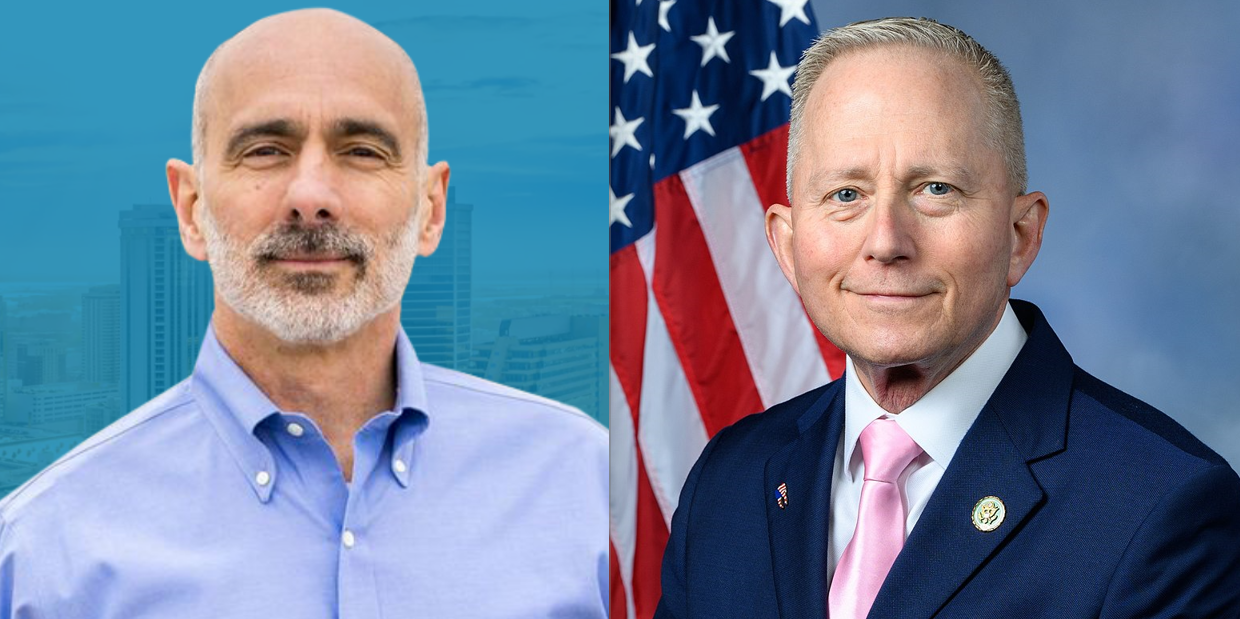
Jeff Van Drew has had quite the transformative political career.
Elected to Congress in 2018 as a conservative Democrat, he then became a Republican, but not a centrist Republican as logic would suggest. Van Drew has gone full-blown MAGA.
The Dems best chance to remove Van Drew from office probably was in 2020 – right after his switcheroo – when Amy Kennedy ran against him. The magic name, notwithstanding, Van Drew was elected as a Republican in CD-2, which ranges over at least parts of six counties in south Jersey.
Joseph Salerno, who owned a software business is the Democrat running against Van Drew this year. Right at the start of a debate this week at Stockton University, he said Van Drew was a mere “lackey” for the MAGA movement.
A bit later, Van Drew offered a line that may explain his success regardless of party:
“You might not like me, you may not agree with me, but dammit, you know I love south Jersey.”
Those sentiments likely go a long way in a region that often feels slighted by the more-populated northern part of the state.
In the debate, Salerno more than once accused Van Drew of forsaking independent thought and accepting the Trump mantra.
Van Drew more or less avoided personal attacks and defended his record.
He said he brought more money to the district from the infrastructure bill than any other New Jersey House member.
That bill, by the way, was championed by congressional Democrats. Van Drew was one of a minority of Republicans who supported it.
He said much of the money he brought home to the district went to combat problems caused by climate change. That included money for dredging, seawalls and beach replenishment.
Unlike some Republicans, Van Drew said all one has to do to accept climate change is to talk to fishermen, as he does. He said they know that water levels are rising and that the ocean is getting warmer.
Van Drew opposes off-shore windmills. Salerno said that is short sighted. He said wind turbines are “spinning around the world” and that one should be able to balance energy policy and a robust tourist industry on the Jersey Shore.
Like many Republicans, Van Drew talked about the nation being “energy independent.”
That prompted Salerno to point out – correctly – that the United States is now producing more oil than it ever did – an estimated 13.2 million barrels a day.
On immigration, the responses were familiar to anyone following politics today.
Van Drew spoke of migrants threatening the security of Americans – and also costing taxpayers lots of money.
But wait, said Salereno.
It was Donald Trump and Senate Republicans who stopped a compromise immigration bill engineered by a conservative senator from Oklahoma – James Lankford.
Van Drew said that was a “bad bill,” noting that it still permitted thousands to cross the border illegally, which Salerno disputed.
He said Van Drew’s response was “no solutions, all bluster.”
Republicans outnumber Democrats in the district by about 18,000 on the registration rolls, but given the fact Van Drew has won representing both parties, those numbers may be irrelevant.
(Visited 20 times, 20 visits today)
In a recent turn of events, New Jersey State Senator Michael Salerno has publicly criticized Congressman Jeff Van Drew for aligning himself with the controversial MAGA (Make America Great Again) movement. Salerno, a fellow Democrat, expressed his disappointment in Van Drew’s decision to embrace the ideals and rhetoric of the MAGA movement, which has been widely criticized for promoting divisive and inflammatory rhetoric.
Salerno’s criticism comes at a time when tensions within the Democratic party are running high, with many members feeling disillusioned by Van Drew’s apparent shift towards more conservative ideologies. Van Drew, who famously switched parties from Democrat to Republican in 2019, has been a vocal supporter of former President Donald Trump and his policies.
Salerno’s concerns about Van Drew’s alignment with the MAGA movement are not unfounded. The movement, which gained prominence during Trump’s presidency, has been associated with white nationalism, xenophobia, and conspiracy theories. Critics argue that by aligning himself with the MAGA movement, Van Drew is legitimizing and promoting these harmful ideologies.
Furthermore, Salerno believes that Van Drew’s alignment with the MAGA movement could have negative consequences for the Democratic party as a whole. By embracing a movement that is seen as divisive and exclusionary, Van Drew risks alienating moderate and progressive voters who may not align with the ideals of the MAGA movement.
In response to Salerno’s criticism, Van Drew has defended his decision to align with the MAGA movement, stating that he is simply standing up for the values and beliefs of his constituents. However, many within the Democratic party remain skeptical of Van Drew’s motives and worry about the implications of his alignment with the controversial movement.
As the debate over Van Drew’s alignment with the MAGA movement continues to unfold, it remains to be seen how this will impact his political career and the Democratic party as a whole. One thing is clear: the rift within the party is growing deeper, and the consequences of Van Drew’s alignment with the MAGA movement could have far-reaching implications for both him and his fellow Democrats.


